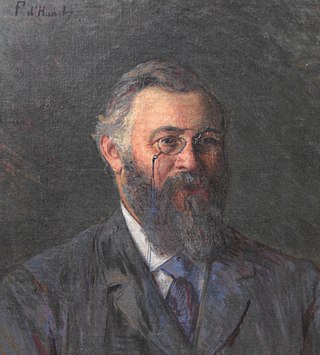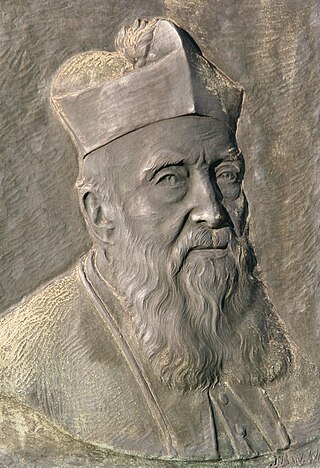History and profile
Luxemburger Wort has been published since 1848. [3] The paper was founded just three days after press censorship was abolished. The newspaper is mainly written in German, but includes small sections in both Luxembourgish and French. [3] For many years from its founding until recently, the paper was part of the Saint-Paul Luxembourg S.A. [4] which was owned by the Archdiocese. The paper has a strong Catholic leaning. [5]
It is not known exactly how the Apostolic Vicar Jean-Théodore Laurent, who had been accused by the government of provoking the 1848 Revolution and had to leave the country six weeks later, brought about the creation of the newspaper. [6]
Nevertheless, Laurent wrote to his brother that they were making use of freedom of the press. [6] In 1948, the bishop Joseph Laurent Philippe described the foundation of the Luxemburger Wort as Laurent's last great act; the director of the seminary Georges Hellinghausen described Laurent's participation as decisive. [6] The new newspaper was an aggressive Catholic opposition newspaper and, in part, combative towards the liberal state. Its creation marked the true birth of political Catholicism in Luxembourg. [6]
From its very foundation, the newspaper opposed the Volksfreund , founded by Samuel Hirsch, and the Judenrabbiner, as well as the subsidy for the Jewish congregation. In the period from 1849 to 1880, on average it published two anti-Semitic articles per week. [7]
From 1938, the newspaper opposed Nazi Germany. In 1940, after the German invasion of Luxembourg, the Luxemburger Wort was co-opted as part of the occupation. The director Jean Origer and the editors Batty Esch and Pierre Grégoire were arrested by the Nazis and sent to a concentration camp. Pierre Grégoire was the only one of them to survive imprisonment. [8] After the liberation of Luxembourg, the paper produced the headline: Lëtzebuerg as fräi! ("Luxembourg is free!"). At the same time this was one of few editions that appeared entirely in Luxembourgish; the publishing house also changed its name from German into French as a symbolic act.
After André Heiderscheid's replacement as editor-in-chief by Leon Zeches, the latter sought to 'de-ideologise' the newspaper and to distance it more strongly from the Christian Social People's Party. [9] For example, the paper increasingly started to report on initiatives, debates and congresses of other political parties as well. [9]
From 17 March 2005 to 21 March 2008, the paper called itself d' Wort: Luxemburger Wort für Wahrheit und Recht. [10]
In the period of 1995–1996 Luxemburger Wort had a circulation of 85,000 copies, making it the best-selling paper in the country. [11] The circulation of the paper was 83,739 copies in 2003. [4] In 2006 its circulation was 79,633 copies. [12] The paper had a circulation of almost 70,000 copies a day and a daily readership of more than 180,000 (print and e-paper) in 2007, [13] making it Luxembourg's most popular newspaper by both counts. [14]

Luxembourg has participated in the Eurovision Song Contest 37 times since its debut at the first contest in 1956. The nation participated in all but one event between 1956 and 1993, only missing the 1959 contest. After finishing among the bottom seven countries in 1993, Luxembourg was relegated and prevented from competing in 1994. The nation did not return to the contest in 1995, and would make no further appearances over the next three decades. The country is set to return to the event for the first time in 31 years in 2024.

The linguistic situation in Luxembourg is characterized by the practice and the recognition of three official languages: French, German, and the national language Luxembourgish, established in law in 1984. These three languages are also referred to as the three administrative languages, as the constitution does not specify them as being "official". As of 2018, 98% of the population was able to speak French at more or less a high level, 78% spoke German, and 77% Luxembourgish.

Jean Bernard was a Catholic priest from Luxembourg who was imprisoned from May 1941 to August 1942 in the Nazi concentration camp at Dachau. He was released for nine days in February 1942 and allowed to return to Luxembourg, an episode which he later wrote about in his memoirs of the camp and which was turned into a film.
The Party of the Right, abbreviated to PD, was a political party in Luxembourg between 1914 and 1944. It was the direct predecessor of the Christian Social People's Party (CSV), which has ruled Luxembourg for all but fifteen years since.

Dr. Michel Welter was a Luxembourgish politician, and former leader of the Socialist Party. A member of Luxembourg's Chamber of Deputies, he served as the Director-General for Agriculture, Commerce, and Industry from 24 February 1916 until 3 January 1917, during the German occupation.

Tageblatt is a German language daily newspaper published in Esch-sur-Alzette, Luxembourg by Editpress.
Mediahuis Luxembourg S.A., formerly Groupe Saint-Paul Luxembourg is the owner of Luxembourg's largest newspaper, Luxemburger Wort, and its news website wort.lu. It is based at a large centralized complex in Gasperich, in the south of Luxembourg City.
The Council of State is an institution in Luxembourg that advises the national legislature, the Chamber of Deputies. Until 1 January 1997, it was also the country's supreme administrative court, but this function was ceded to the newly created Administrative Tribunal and Administrative Court.

The Rat für deutsche Rechtschreibung, or RdR, is the main international body regulating Standard High German orthography.
The Lëtzebuerger Journal is an online magazine in Luxembourg. It was formerly a daily newspaper published six times a week until 1 January 2021. The online magazine is currently managed by Daniel Nepgen, Lynn Warken and Melody Hansen (editor-in-chief).
d'Lëtzebuerger Land is a weekly newspaper published in Luxembourg. It is in German, French and Luxembourgish.
La Voix du Luxembourg was a French-language newspaper published in Luxembourg between 2001 and 2011.
The Obermosel-Zeitung was a German-language newspaper published in Luxembourg between 1881 and 1948. In 1948, it merged into the Lëtzebuerger Journal.

Jean Origer was a Luxembourgish cleric and director of the newspaper Luxemburger Wort. Jean Origer was born in Esch-Alzette and later became a member of the Chamber of Deputies of Luxembourg. During World War II, He was interned in the Mauthausen concentration camp where he died. A street in his hometown of Esch-Alzette is named after him.
The literature of Luxembourg is little known beyond the country's borders, partly because Luxembourg authors write in one or more of the three official languages, partly because many works are specifically directed to a local readership. Furthermore, it was not until the 19th century that the literature of Luxembourg began to develop in parallel with growing awareness of the country's national identity following the Treaty of Paris (1815) and the Treaty of London (1867).

Luxembourg competed at the 2012 Summer Olympics in London, from 27 July to 12 August 2012. The Luxembourg Olympic and Sporting Committee sent a delegation of nine athletes to the event—five men and four women—who competed in 7 sports.

The involvement of the Grand Duchy of Luxembourg in World War II began with its invasion by German forces on 10 May 1940 and lasted beyond its liberation by Allied forces in late 1944 and early 1945.

Johannes Olav Fallize, Ph.D., D.Th., was the first Roman Catholic bishop in Norway since the Reformation. As the head of the Catholic Church of Norway for 35 years, he was the Prefect Apostolic of Norway from 1887 to 1892 and the Vicar Apostolic of Norway from 1892 to 1922.

The Allianz vun Humanisten, Atheisten an Agnostiker is a Luxembourgish association that serves the interests of atheists, humanists, skeptics and agnostics in the Grand-Duchy. It also explicitly supports secularist positions. Its official abbreviation is A.H.A. Lëtzebuerg; usually this is shortened to AHA, sometimes with an extra exclamation mark. The AHA was founded on 13 May 2010 as an association without lucrative purpose (asbl). AHA is a member of the European Humanist Federation and the International Humanist and Ethical Union. From 2010 up to 10 May 2019, the association was chaired by biologist Dr. Laurent Schley. The current chair is psychologist Dr. Robert A.P. (Bob) Reuter.
Events in the year 2023 in Luxembourg.










